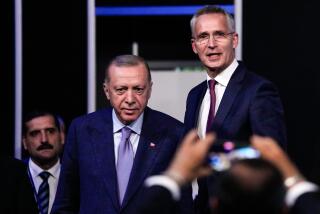Bulgaria Oppressing Ethnic Turks, U.S. Says
- Share via
WASHINGTON — A reported Bulgarian government campaign aimed at obliterating the ethnic identity of the country’s Turkish minority is believed to have led to “several hundred” deaths among the Turkish population and the killing of some government security agents, State Department officials said Monday.
Reports of the campaign have led to large-scale street demonstrations in Istanbul and prompted the Turkish government to make at least two official protests to Bulgaria. The Bulgarian government has denied any ill treatment of its Turkish minority.
Reflecting growing U.S. concern over the reports, Assistant Secretary of State Elliott Abrams on Monday issued the first U.S. public statement on what he called Bulgaria’s “gunpoint program.”
The statement came in response to a Washington Post inquiry as Turkish Prime Minister Turgut Ozal arrived here Sunday night on an official visit.
No Specific Numbers
“We have have reason to believe that several hundred members of the Turkish minority have been killed and more wounded” in the course of the campaign that began last year and reached a peak early this year,” a State Department official said. “We also have reports that some security personnel have been killed and wounded, but we don’t have specific numbers.,”
Abrams, the State Department’s senior human rights official, said in the statement that “the government of Bulgaria appears determined to denationalize ethnic and cultural distinctions of the 1 million-strong Turkish-speaking population inside its borders.”
He said Bulgarian police and military have sought to coerce members of the Turkish minority “voluntarily” to surrender their Turkish identity and adopt Slavic names.
“In some cases, troops supported by tanks have surrounded entire villages, transporting the inhabitants to central administrative centers for renaming. There are also reliable reports that some resisters have been summarily shot,” Abrams said.
He added that all Bulgarian-supported Turkish-language radio broadcasts have ceased and that Turkish language newspapers are no longer published in the country.
‘Fabricated and Ungrounded’
The Bulgarian Embassy, in written comments, rejected reports of forced changes of names by “so-called Bulgarian Turks,” calling the accounts “fabricated and ungrounded.”
A statement originally issued in Sofia said that every citizen has the right to choose or change his name under Bulgarian law and that “voluntary change of names” does not damage lives or rights of those concerned.
Turkish Foreign Ministry spokesman Yalim Eralp said last week that Bulgaria has rejected both diplomatic notes about the treatment of Bulgarian Turks. Responding to the Bulgarian position, Eralp said his government’s protest is “completely humanitarian” and “has nothing to do with intervening in another country’s internal affairs.”
He added: “These people, while they are Bulgarians, have the same blood as Turks. They are our kinsmen.”
Unconfirmed reports circulating in Moscow indicated that at least 40 Bulgarian soldiers were killed in recent serious clashes with members of the Turkish minority. One report said two Bulgarian Politburo members had been called to the Soviet capital to discuss suppression of the Turks.
Ready to Accept Turks
In mid-March, Ozal said Turkey was ready to accept all of the ethnic Turks residing in Bulgaria rather than have them face continued persecution.
Shortly thereafter, Dimitur Y. Stanishev, a secretary of the Central Committee of the ruling Bulgarian Communist Party, was quoted as saying, “There will be no emigration of Bulgarian citizens to Turkey.”
Stanishev added “we shall have no talks with any country about this” because Bulgarian citizens should not become “a bargaining chip” during “any negotiations and dealings.”
State Department officials said the United States has raised the fate of the Turkish minority with Bulgaria on several occasions, without satisfaction from Sofia.
More to Read
Sign up for Essential California
The most important California stories and recommendations in your inbox every morning.
You may occasionally receive promotional content from the Los Angeles Times.












